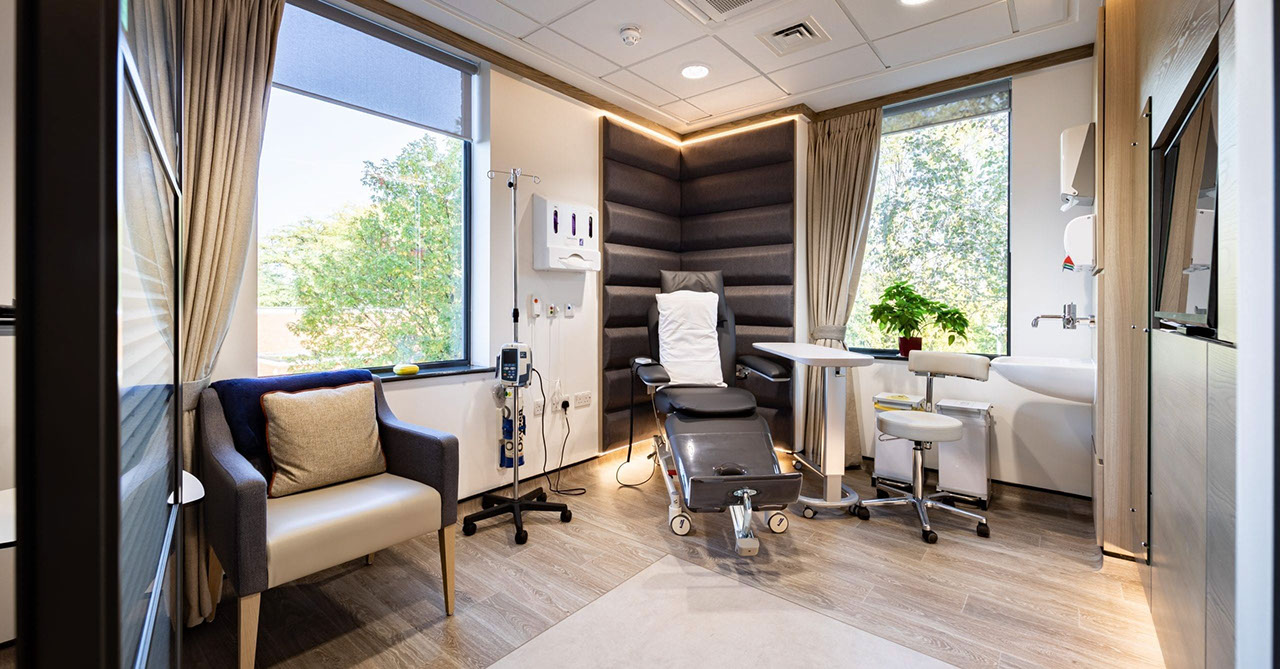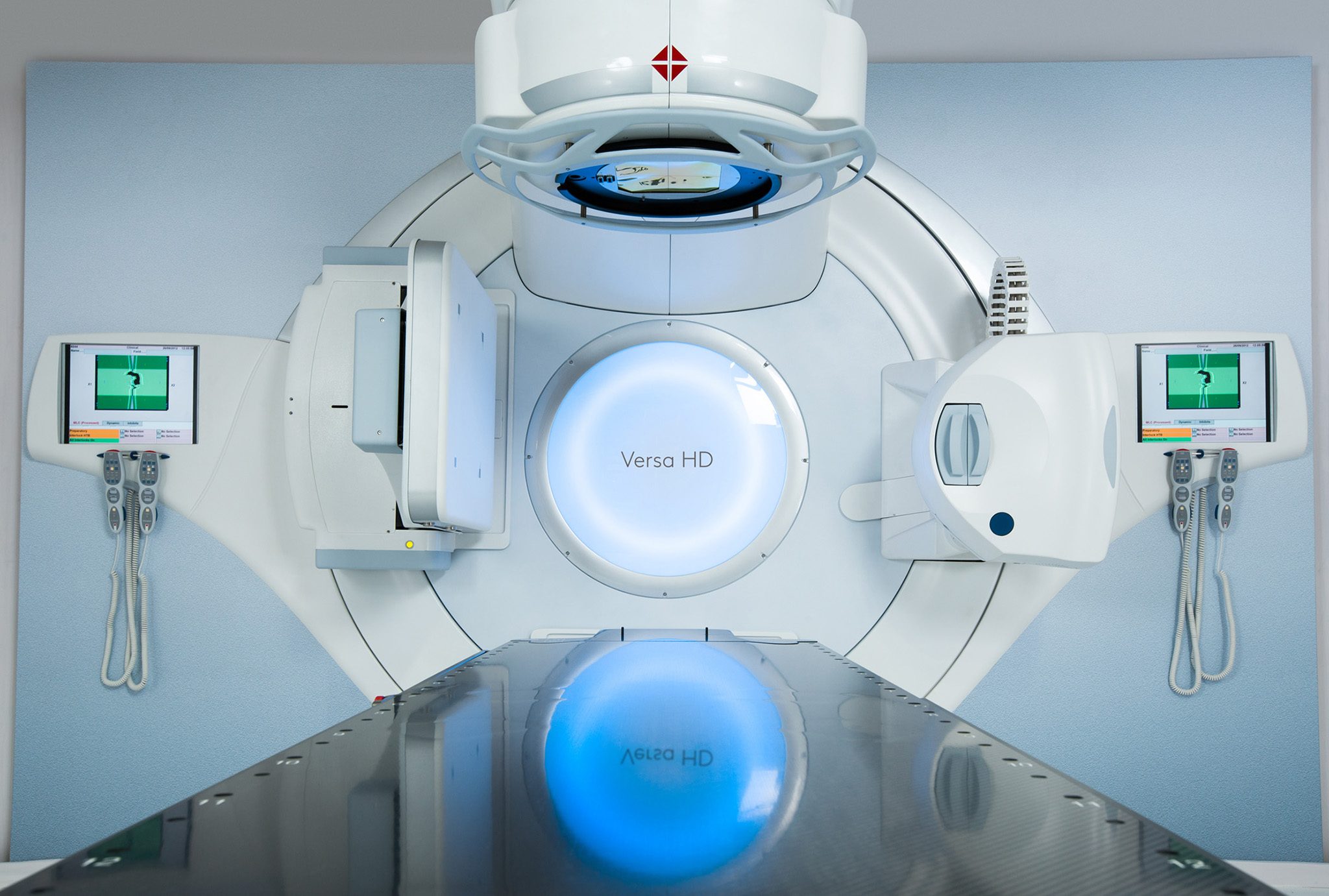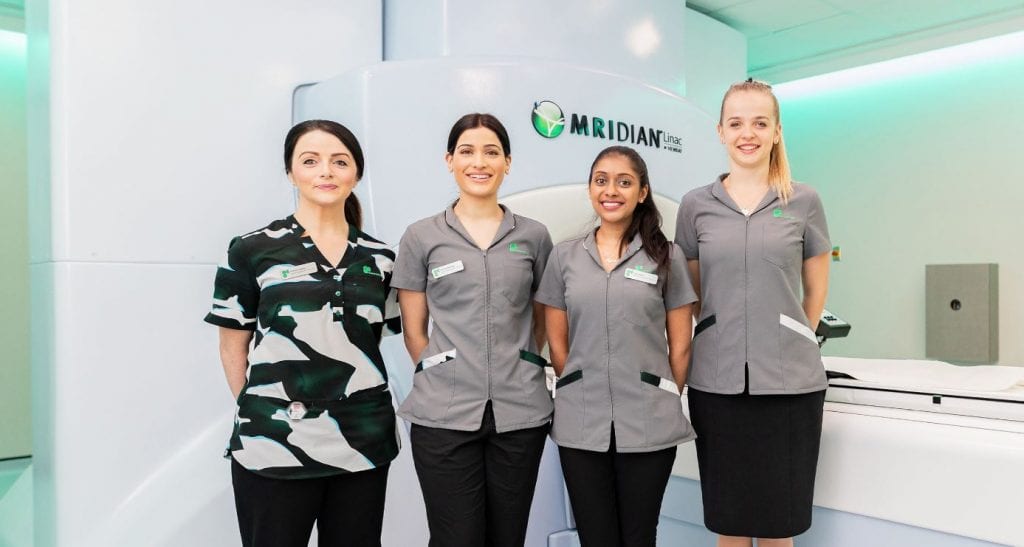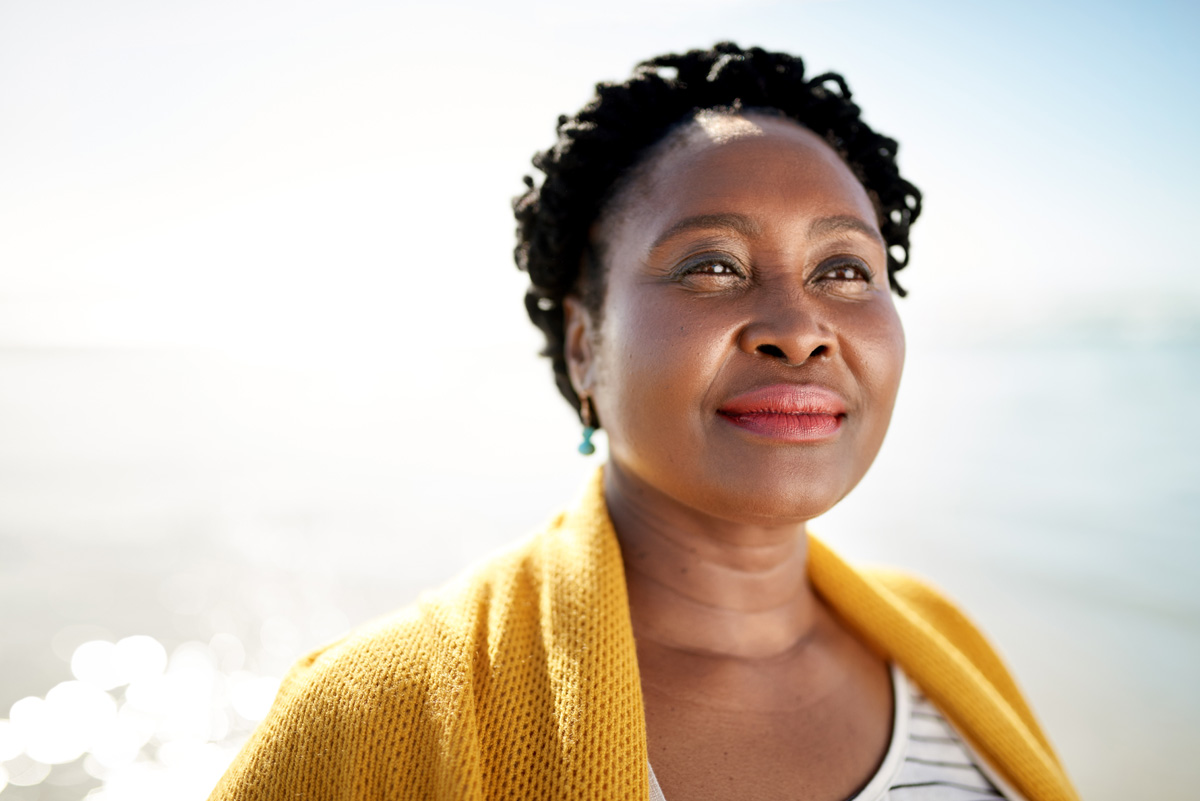- Patients
- Exploring cancer care
- Conditions we treat
- Gastrointestinal cancer
- Small bowel cancer
Introduction
Small bowel cancer treatment and diagnosis
Small bowel cancer treatment at GenesisCare
We are specialists in the latest techniques for diagnosing and treating all types of cancer, including small bowel cancer. We have teams of highly trained cancer specialists who are experts in this disease. They work together to evaluate the newest, evidence-based approaches so we can offer these to every patient – without delay.

Treatment overview
Chapter 1
Treatment overview
Small bowel cancer treatment may include surgery, chemotherapy, targeted therapy, radiotherapy or Theranostics, along with specialists in diet if needed. We combine this with consultant-led integrative care, such as wellbeing therapies and psychological support, to help you achieve the best possible outcome. Our qualified physiotherapists and wellbeing consultants will carefully plan these therapies tailored to your needs by working with you and your consultant.
Small bowel cancers can develop in the duodenum, jejunum and ileum, which make up the small intestine. According to Cancer Research UK, there are 1,700 new cases of small bowel cancer in the UK every year, but despite this, early diagnosis and treatment can improve outcomes for many. There are four main types of small bowel cancer and management of these conditions can be different. Your doctor will only select the most appropriate small bowel cancer treatment for you according to your specific condition.
We are the UK‘s leading specialist private cancer care provider. By choosing us, you can be reassured that your treatment will be managed by a team of specialists working together, with you, to decide the best, personalised care plan for your diagnosis.
It‘s our commitment to offering world-class care to every patient with cancer.
How is small bowel cancer treated?
There are a number of options of treatment available for small bowel cancer, such as:
- Surgery – removal of the cancerous part of the small bowel
- Chemotherapy – anti-cancer (cytotoxic) drugs that destroy the cancerous cells
- Targeted therapy – a specialised group of drugs that attack or block certain processes in the cancer cells
- Radiotherapy – high-energy radiation beams which are targeted at the cancer cells
Contact us
These web pages provide more information about small bowel cancer treatment at GenesisCare. If you'd like to contact us in confidence, we will be happy to answer any of your questions.
Diagnostics
Chapter 2
Diagnostics
How is small bowel cancer diagnosed?
At GenesisCare, we diagnose and treat a wide range of cancers, and we understand that this can be a very worrying time. Our diagnostic services are first-class, and our commitment is to give you the answers you need, as quickly as possible. It‘s important to remember that symptoms can often be caused by other conditions and not always small bowel cancer. But, whatever your diagnosis, we can make sure you get the expert care you need and without delay.
If you‘re concerned about small bowel cancer symptoms, we offer specialist small bowel cancer tests and diagnostics in our centres. Here you‘ll see one of our expert consultants who specialise in cancers affecting the small intestine. They‘ll assess your symptoms and, if necessary, refer you for diagnostic tests such as blood tests, endoscopy or imaging scans (including barium X-ray meal, CT, MRI or ultrasound). You may also need to see one of our and specialist dietitians.
What are the symptoms of bowel cancer?
Small bowel cancer symptoms can be vague and similar to other conditions such as irritable bowel disease or inflammatory bowel disease (IBD), so it‘s often tricky to diagnose. The main signs and symptoms of small bowel cancer are:
- Abdominal pains
- Dark or black stools – this is because of bleeding
- Diarrhoea
- Unexpected weight loss
- Nausea and vomiting
- Tiredness
- Low red blood cell count (anaemia)
Other benign conditions may cause these symptoms and having one or more of the signs above doesn‘t mean you have small bowel cancer. If you‘re concerned about small bowel cancer, you should talk to your GP, and they can refer you to a specialist if they think it‘s needed, or you can book directly with us.
Sometimes, small bowel cancer can cause a complete or partial blockage of the small bowel. Symptoms of this include:
- Abdominal pains
- Vomiting
- Constipation
- Bloating
In rare cases, a blockage can cause the small bowel to tear. This can happen suddenly and is a serious condition. Signs of a tear in the bowel are:
- Severe pain
- Feeling faint or dizzy
- Abdominal swelling
If you think you have a blockage or tear in the bowel, you need to go to your nearest accident and emergency department (A&E).

Surgery
Chapter 3
Surgery
Surgery is the primary treatment for small bowel cancer and forms part of an overall treatment and care plan for cancers in the duodenum, jejunum and ileum.
Our consultants include expert surgeons who work in local and nationally renowned hospitals and will work together with other cancer specialists to decide the best course of treatment for you. If your consultant recommends small bowel cancer surgery, this can be arranged conveniently at one of our partner hospitals. You can then continue your other treatments at GenesisCare.
There are different procedures for small bowel cancer surgery, and your surgeon will recommend the most appropriate technique depending on the location, size and stage of your tumour. Your surgeon will usually remove your cancer and some surrounding tissue, then re-join the small bowel. In some cases, nearby organs such as your colon or stomach may also need to be removed. If your cancer is causing a blockage in your small bowel, surgery can help relieve any associated symptoms.
Our team also includes specialist dietitians, who may be involved in preparing you for surgery and helping with your recovery and rehabilitation.
Surgery side effects
No treatment is without side effects. Your doctor will explain these to you, together with the ways your treatment plan and supportive care can help manage or minimise these.
Drug treatments
Chapter 4
Drug treatments
At GenesisCare, we offer all drug therapies that can be used to treat small bowel cancer, including many of the newest treatments. Depending on how these treatments are given, you may need to attend one of our private chemotherapy suites, which are staffed by our specialist nurses. Our compassionate nursing teams are available 24/7 on a dedicated on-call telephone service and can answer any queries during your treatment. They'll be able to provide advice about side effects or symptoms and help arrange appropriate medical care when needed.
Our centres have all received the Macmillan Quality Environment Mark to reflect the quality of care we provide for people living with cancer.
There are different types of drug treatments, also called systemic anti-cancer therapies. Our expert teams continually review and assess new treatments to make these available to GenesisCare patients as early as possible.
Chemotherapy for small bowel cancers
Chemotherapy uses anti-cancer drugs to destroy cancer cells. Chemotherapy is not often a primary treatment for small bowel cancer, but it may be delivered after surgery to reduce the chance of cancer from returning, or to treat advanced small bowel cancers cancer that have spread (metastasised) to other parts of the body.
Targeted therapy for small bowel cancers
Targeted (also called biological) therapies are a specialised group of drugs that have been designed to attack or block specific processes in cancer cells that tumours depend on to survive and grow. You may have targeted therapies as part of your treatment for particular types of small bowel cancer called neuroendocrine tumours (NETs) and gastrointestinal stromal tumours (GISTs).
Palliative care
If your cancer has spread to other parts of the body, it‘s called advanced or metastatic small bowel cancer. At GenesisCare, you can receive palliative drug treatment for advanced small bowel cancer, to reduce the size and progress of your cancer and ease any symptoms.
Personalised medicine
For some advanced cancers, we use specialist tests, such as liquid biopsy or genomic testing, to understand cancer cells’ genetic makeup. This helps us to identify which drugs are available to work against the particular genetic mutations in a cancer, allowing us to start effective treatment without delay.
There may also be opportunities to access clinical trials for the newest treatments for small bowel cancer.
Drug treatment side effects
No treatment is without side effects. Your doctor will explain these to you depending on your drug treatment, together with how your treatment plan and supportive care can help manage or minimise these.

Radiotherapy
Chapter 5
Radiotherapy
Radiotherapy uses targeted, high-energy radiation beams to destroy cancer cells. Radiotherapy is not a common small bowel cancer treatment, but it may be used to shrink the tumour before surgery or reduce the cancer risk coming back after surgery.
At GenesisCare, we are the leading private provider of radiotherapy in the UK and offer world-class expertise and state-of-the-art facilities that specialise in advanced radiotherapy techniques. Our latest-generation radiotherapy machines (called linacs) deliver highly targeted radiation beams that are designed to be effective while minimising the radiation dose to healthy tissues.
Your treatment will be governed by our expert multidisciplinary teams (MDTs), consisting of oncologists, radiotherapists and dietitians, who work together to ensure that you only receive the best possible care.
Radiotherapy techniques for small bowel cancer
Volumetric modulated arc therapy (VMAT) is a modern radiotherapy technique that directs radiation beams in an arc across the treatment area. Together with surface-guided radiotherapy (SGRT), it‘s possible to precisely target areas of cancer, adjusting the beam and intensity of the radiation dose to allow for movements in the body and avoid healthy tissues. Side effects of radiotherapy occur when healthy tissues receive radiation, so using this technique helps to limit the dose to tissues and organs surrounding the tumour. At GenesisCare, we offer VMAT wherever possible because it is widely recognised to be the highest standard of care currently available for patients needing this type of radiotherapy.
We also offer palliative VMAT radiotherapy for those living with advanced small bowel cancer, where it has spread elsewhere in the body, to improve pain and increase mobility. We understand that fast access to palliative care is paramount and can usually provide treatment within 48 hours of a planning imaging scan.
Side effects of radiotherapy
No treatment is without side effects. Your doctor will explain these to you start your course of radiotherapy, together with the ways your treatment plan and supportive care can help manage or minimise these.

Integrative care
Chapter 6
Integrative care
At GenesisCare, we do more than just treat your cancer. As part of our unique and integrative approach to cancer care, you can expect the best possible care and a personalised treatment plan that includes access to life-changing therapies which are proven to improve cancer-related outcomes. These therapies will be tailored to you to help you manage and cope with your cancer as well as the specific side effects of treatment.
Exercise medicine
Exercise medicine is a personalised programme of carefully planned and supported physical activity that has been shown to improve outcomes for cancer patients, enhancing quality of life and limiting the impact of cancer, such as by improving strength and reducing fatigue. One of our physiotherapists specialising in exercise for people living with cancer will provide a 12-week programme tailored to your needs and supported by our dedicated GenesisCare Exercise Medicine app. They‘ll work closely with you to monitor changes in your health and support you throughout the programme to help you get the best results. This is available at selected GenesisCare centres.
Wellbeing
We also offer a wellbeing expert and holistic therapies such as counselling, acupuncture, massage and reflexology through our unique partnership with the Penny Brohn UK charity. A range of services is available to all small bowel cancer patients at any of our 14 UK centres.
Why choose us?
Chapter 7
Why choose us?
GenesisCare is a leading private provider of cancer care, offering the latest innovations and techniques that are proven to be safe and effective. If you choose us for small bowel cancer treatment you will be under the care of a team of experts, including consultant oncologists, surgeons and dietitians. They will design a personalised care plan based around your diagnosis and preferences, with treatment starting within days if needed. Every patient is also supported through their journey with life-changing therapies, such as exercise medicine and psychological support.
Our dedicated cancer centres are convenient and easy-to-access. You can use your private medical insurance, and we‘re recognised by all leading insurers.
We‘re proud that so many patients rate our care as excellent as we help them through their cancer journey. Find out more about the unique experiences of people who have had their cancer diagnosis or treatment at GenesisCare in our patient stories section.

Thank you for your enquiry.
We'll be in touch during our next working day (Monday to Friday, except for bank holidays)
Form submission error
There was an error submitting this form. Please refresh your screen and try again. If this error persists, please email contactus@genesiscare.co.uk for assistance.
Read next

Doctors
Our doctors
GenesisCare works with many leading and experienced cancer doctors who share our commitment to providing excellent patient care

Centres
Our centres
With 440 centres across the world, we're continuing to diagnose and treat without delay, bringing specialist care closer to our patients in the UK, Spain, Australia and the US.

Cancer care
Exploring cancer care
We are the UK’s leading private provider of advanced radiotherapy and cancer care. We offer fast access to the latest technology and treatments that has been proven to make a difference.

Cancer care
How can we help?
Accessing world-class cancer care is easier than you think. Follow these easy steps to get treatment, tests and scans, or a second opinion at GenesisCare, and find out the different ways of funding your cancer care.

Patient support
Patient stories
We believe patients can be our teachers and trusted advisers, benefiting from their unique experiences.